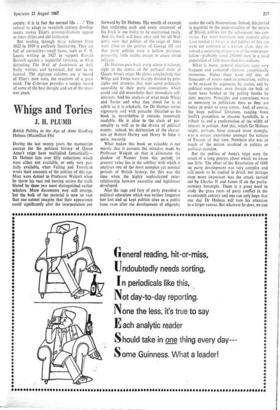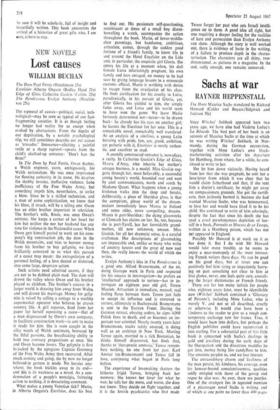Whigs and Tories
J. H. PLUMB
During the last twenty years the manuscript sources for the political history of Queen Anne's reign have multiplied fantastically— Dr Holmes lists over fifty collections which were either not available, or only very par- tially available, when Felling and Trevelyan wrote their accounts of the politics of this age. Most were denied to Professor Walcott when he threw his vast red herring across the trails blazed by these two most distinguished earlier scholars. More documents may still emerge, but the bulk of the material is now so vast that one cannot imagine that their appearance could significantly alter the interpretation put forward by Dr Holmes. The wealth of example that underpins each and every statement of his book is too bulky to be overturned easily. And his book will bury once and for all Wal- cott's view that politics of the reign of Anne were close to the politics of George III and that party politics were a hollow pretence, possessing little reality except in crises about
Dr Holmes puts back party where it belongs, right in the centre of the political strife of Queen Anne's reign. He shows conclusively that Whigs and Tories were sharply divided by prin- ciples and interests, that men acted politically according to their party convictions, which could and did overwhelm their immediate self- interests. And his analysis of what made Whigs and Tories and what they stood for is as subtle as it is scholarly, for Dr Holmes writes vigorously and with panache. Detailed as his book is, nevertheless it remains immensely readable. He is alive to the clash of per- sonality as well as to the drama of political events: indeed, his delineation of the charac- ters of Robert Harley and Henry St John is quite masterly.
What makes this book so valuable is not merely that it corrects the mistakes made by Professor Walcott or that it eliminates the shadow of Namier from this period; its greatest value lies in the subtlety with which it analyses one of the most complex yet seminal periods of British history, for this was the time when the highly sophisticated inter- relationship between executive and legislature developed.
Also the rage and fury of party provided a political education which was neither forgotten nor lost and so kept politics alive as a public issue even after the development of oligarchy under the early Hanoverians. Indeed, this period is e,sential to the understanding of the nature at British politics for the subsequent two cen- turies. For what historians and students alike have tended to forget is that politics of this age were not confined to a narrow class, they. in- volved a surprising proportion of the male popu- lation—probably some 250,000 men in a total population of little more than live millions.
What is more, general elections were very frequent and contested elections exceptionally numerous. Hence there were still tens of thousands of voters open to conviction, willing to be swayed by argument, by events, and by political experience, even though the bulk of them were herded to the polling booths by their masters. Principles and convictions were as necessary to politicians then as they are today in order to sway voters. And, of course, the huge political literature, ranging from Swift's pamphlets to obscene handbills, is a tribute to and a confirmation of the width of interest in politics. And this, which Dr Holmes might, perhaps, have stressed more strongly, was a unique experience amongst the nations of Europe of that time. Nowhere else was so much of the nation involved in politics or political decision.
But the politics of Anne's reign were the result of a long process about which we know too little. The effect of the Revolution of 1688 on party development was very complex and still needs to be studied in detail, but perhaps even more important was the attack carried out by Charles II and James II on the parlia- mentary boroughs. There is a great need to study the grass roots of party conflict in the seventeenth century and one can only hope that one day Dr Holmes will turn his attention to a larger canvas. But whatever he does, we can be sure it will be scholatly, full of insight and beautifully written. This book announces the arrival of a historian of great gifts who, I am sure, is here to stay.































 Previous page
Previous page